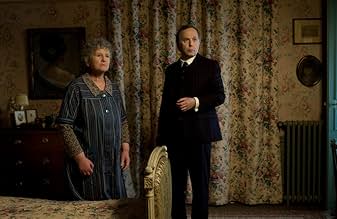VALUTAZIONE IMDb
7,1/10
10.869
LA TUA VALUTAZIONE
A Parigi negli anni '60, la vita di una coppia conservatrice viene sconvolta da due domestiche spagnole.A Parigi negli anni '60, la vita di una coppia conservatrice viene sconvolta da due domestiche spagnole.A Parigi negli anni '60, la vita di una coppia conservatrice viene sconvolta da due domestiche spagnole.
- Regia
- Sceneggiatura
- Star
- Premi
- 2 vittorie e 3 candidature totali
Recensioni in evidenza
Thank goodness I got tired of the trash that Hollywood tips out like churned mince through a mincer and decided to begin watching foreign films!
French movies, in particular, seem to have a knack for producing a love story that doesn't leave me puking with either boredom or the sheer stupidity and bad acting.
This is one such little gem. Delightful, understated, charming. When a Spanish maid moves to France she takes a job with a wealthy businessman and his detached wife. As the wife listens more and more to her malicious, gossipy society friends, she becomes suspicious of her husband having an affair.
Her husband certainly is up to many things, but he's a lovely man, played delightfully, and he's falling in love alright... with a whole new way of life.
I enjoyed every minute of this!
French movies, in particular, seem to have a knack for producing a love story that doesn't leave me puking with either boredom or the sheer stupidity and bad acting.
This is one such little gem. Delightful, understated, charming. When a Spanish maid moves to France she takes a job with a wealthy businessman and his detached wife. As the wife listens more and more to her malicious, gossipy society friends, she becomes suspicious of her husband having an affair.
Her husband certainly is up to many things, but he's a lovely man, played delightfully, and he's falling in love alright... with a whole new way of life.
I enjoyed every minute of this!
Philippe Le Guay and Fabrice Luchini, two names that go together well, are more than ever synonymous with good quality comedy. If you want to have a good time, feel free to see the three films they collaborated on: "L'année Juliette" (1995), in which Luchini makes his life awfully complicated by inventing himself a mistress ; "Le coût de la vie" (2003), where Luchini makes his life ... awfully complicated by being too tight-fisted ; and coming now "Les femmes du 6e étage" (2010), with Luchini in yet another funny role in yet another well- written comedy signed Le Guay.
This time Luchini is Jean-Louis Joubert, a Parisian stockbroker. Like Camille in "L'année Juliette" and Brett in "Le coût de la vie", the character he joyfully slips into is very imperfect and his defects and shortcomings are a sure source of laughter but, unlike in the two former films, Camille will evolve and open up to his true self, making him a more engaging hero than usual. The beginning of the movie illustrates to great effect the imperfect Jean-Louis living his regular but restricted life in his spacious luxury apartment. He is married to a stiff-necked socialite named Suzanne and has two arrogant teenage sons who, being boarders, are currently away from home. The climaxes of his life, besides making money out of thin air, are eating a perfectly cooked soft-boiled egg and being bullied by his old Breton maid. But things start changing once Suzanne hires Maria, a charming young Spanish maid. For some reason some day Jean-Louis follows Maria up the stairs to the sixth floor and discovers a "terra incognita", in other words the maid's rooms below the roofs and the strange people who inhabit them, a handful of female Spanish immigrants. Against all odds this reactionary grand bourgeois develops an instant liking for these women and for their civilization. And of course, he will fall for Maria, but not only because she is pretty, mainly because she belongs to the new world he has just discovered.
A feel good movie in a way, "Les femmes du 6e étage" is much more than just that. It is also and none the less a committed film which, although set in the 1960s, denounces evils still plaguing today's society like, for example, the appalling way immigrants are exploited by their employers and ill-thought of by a majority of the natives of their "home" country, the selfishness of tourists who will not know about the political and social situation of the countries where they spend their holidays (1962's Spain can be replaced in the 2000s by Cuba, Egypt, Tunisia and many other countries)... Conversely the film is a call for tolerance and open-mindedness, for listening to one's heart rather than one's interest. But be reassured, this dimension, although crucial, remains underlying. There are no such things as preaching or political slogans, only a fine cocktail of good acting and tender humor. And sincerity. Did you know that for that matter that Philippe Le Guay had a Spanish maid when he was a kid and that his father was a broker just like Jean-Louis? Did you know that the actresses playing the maids are all Spanish and that some of them do not even speak French? That Luchini did not know a word of Spanish before starting the film? All these facts are good points which contribute to a welcome feeling of authenticity that enhances the film.
To come back to Fabrice Luchini, he is at his best in "Les femmes du 6e étage" for two reasons: first because his character is three-dimensional and goes beyond caricature (if Jean-Louis is stiff, haughty and narrow-minded it is because he reproduces the values inculcated in him both by his parents and by his social class, not because he is rotten to the core) ; second because Fabrice shows the necessary restraint quite in keeping with the role. The result is just perfect. And the rest of the cast is on the par with him: Natalia Verbeke, fresh and adorable as Luchini's love interest ; Sandrine Kiberlain, excellent as Luchini's uptight but not so superficial wife ; and the impeccable ensemble of Spanish actresses, including Carmen Maura and Lola Dueñas (two Almodovar fixtures), Berta Ojea, Nuria Solé and Concha Galan, as the servants from Spain. Also to be acclaimed are Annie Mercier as the spiteful janitor and gloomy-faced Philippe du Janerand as Piquer, Luchini's right-hand man.
Intelligent, sensitive and funny, "Les femmes du 6e étage", the third effort of the winning duo Le Guay-Luchini", deserves its success at the box-office and will not disppoint you.
This time Luchini is Jean-Louis Joubert, a Parisian stockbroker. Like Camille in "L'année Juliette" and Brett in "Le coût de la vie", the character he joyfully slips into is very imperfect and his defects and shortcomings are a sure source of laughter but, unlike in the two former films, Camille will evolve and open up to his true self, making him a more engaging hero than usual. The beginning of the movie illustrates to great effect the imperfect Jean-Louis living his regular but restricted life in his spacious luxury apartment. He is married to a stiff-necked socialite named Suzanne and has two arrogant teenage sons who, being boarders, are currently away from home. The climaxes of his life, besides making money out of thin air, are eating a perfectly cooked soft-boiled egg and being bullied by his old Breton maid. But things start changing once Suzanne hires Maria, a charming young Spanish maid. For some reason some day Jean-Louis follows Maria up the stairs to the sixth floor and discovers a "terra incognita", in other words the maid's rooms below the roofs and the strange people who inhabit them, a handful of female Spanish immigrants. Against all odds this reactionary grand bourgeois develops an instant liking for these women and for their civilization. And of course, he will fall for Maria, but not only because she is pretty, mainly because she belongs to the new world he has just discovered.
A feel good movie in a way, "Les femmes du 6e étage" is much more than just that. It is also and none the less a committed film which, although set in the 1960s, denounces evils still plaguing today's society like, for example, the appalling way immigrants are exploited by their employers and ill-thought of by a majority of the natives of their "home" country, the selfishness of tourists who will not know about the political and social situation of the countries where they spend their holidays (1962's Spain can be replaced in the 2000s by Cuba, Egypt, Tunisia and many other countries)... Conversely the film is a call for tolerance and open-mindedness, for listening to one's heart rather than one's interest. But be reassured, this dimension, although crucial, remains underlying. There are no such things as preaching or political slogans, only a fine cocktail of good acting and tender humor. And sincerity. Did you know that for that matter that Philippe Le Guay had a Spanish maid when he was a kid and that his father was a broker just like Jean-Louis? Did you know that the actresses playing the maids are all Spanish and that some of them do not even speak French? That Luchini did not know a word of Spanish before starting the film? All these facts are good points which contribute to a welcome feeling of authenticity that enhances the film.
To come back to Fabrice Luchini, he is at his best in "Les femmes du 6e étage" for two reasons: first because his character is three-dimensional and goes beyond caricature (if Jean-Louis is stiff, haughty and narrow-minded it is because he reproduces the values inculcated in him both by his parents and by his social class, not because he is rotten to the core) ; second because Fabrice shows the necessary restraint quite in keeping with the role. The result is just perfect. And the rest of the cast is on the par with him: Natalia Verbeke, fresh and adorable as Luchini's love interest ; Sandrine Kiberlain, excellent as Luchini's uptight but not so superficial wife ; and the impeccable ensemble of Spanish actresses, including Carmen Maura and Lola Dueñas (two Almodovar fixtures), Berta Ojea, Nuria Solé and Concha Galan, as the servants from Spain. Also to be acclaimed are Annie Mercier as the spiteful janitor and gloomy-faced Philippe du Janerand as Piquer, Luchini's right-hand man.
Intelligent, sensitive and funny, "Les femmes du 6e étage", the third effort of the winning duo Le Guay-Luchini", deserves its success at the box-office and will not disppoint you.
The movie plot about the life of Spanish immigrants in France in the 1960s showing experiences of poor maids as immigrants and adequately reflecting us how was the life of that time . In 1960s Paris, a conservative couple's lives are turned upside down by various Spanish maids . The peculiar marriage called Jean-Louis Joubert (Fabrice Luchini) and Suzanne Joubert (Sandrine Kiberlain) carry out a different life , as Jean-Louis is a hard-working executive and Suzanne is a snobbish wife . The affluent man and the selfish woman live a dull life and they have two arrogant children in a boarding school . At least until due to fortuitous events , there appears Maria (Natalia Verbeke) , the beautiful new maid at the service of Jean-Louis' family, makes him discover the servants' quarter on the sixth floor of the luxurious building he owns and lives in . There lives a community (Carmen Maura as Concepción Ramirez , Lola Dueñas as Berta Ojea as Dolores Carbalan , Nuria Solé as Teresa and Concha Galán as Pilar) of likable Spanish maids , they have said goodbye their families and went abroad . There take place the problems to adapt into a new life ; but later on , they discover a new and agreeable existence . The maids will help Jean-Louis to open to a new culture , introducing him a joyful Spanish group and a new approach of life . In their help and more precisely in the company of charming Maria , Jean-Louis to be turned into a good and philanthropist man .
This interesting film is full of humor , drama , touching scenes and good feeling . It is a simple , dramatic and humorous portrait of a time when the Spanish people had to go other countries in order to encounter a work . This amusing as well as funny picture deals about lives of the immigrants with a minor support in their live condition and including a touching and emotive finale . As in Spain of the 50s and 60s ruled by General Franco there's no job , there's no money , and there's no option for the poor people but to emigrate to a foreign country and attempting to encounter work . As it concerns about the Spanish way of life of a crowd of maids , their habits , costumes ; at the same time they improve the serious but uptight stockbroker who lives a steady yet boring life , being suddenly changed when appear the Spanish maids ; as Jean-Louis will gradually become another man, a better man . Actors are frankly magnificent with a first-rate acting for whole cast . Sensational Fabrice Luchini along with the wife played Sandrine Kinberlain and a gorgeous as well as sympathetic Natalia Verbeke . Special mention to the group of Spanish maids magnificently performed by Carmen Maura , Lola Dueñas , Berta Ojea , among others . Colorful and evocative cinematography by Jean Claude Larrieu . Imaginative as well as sensitive original Music by Jorge Arriagada , Raul Ruiz's usual . It was a success among spectators, as well as a hit smash in the various film festivals it took part in ; as it achieved Prix d'interprétation à Natalia Verbeke au festival Sarlat 2010 .
The motion picture was very well directed by Philippe Le Guay . Philippe Le Guay took inspiration from his own childhood , his father was a stockbroker like Jean-Louis Joubert in the film and he himself had a Spanish maid. This was the number one comedy smash hit from this director . He's a good writer and filmmaker who has directed a few movies , many of them starred by his fetish actor , Fabrice Luchini , such as "Cycling with Moliere" , "The Cost of Living" ¨L'année Juliette¨ and this ¨The Women on the 6th Floor" , his best picture .
This interesting film is full of humor , drama , touching scenes and good feeling . It is a simple , dramatic and humorous portrait of a time when the Spanish people had to go other countries in order to encounter a work . This amusing as well as funny picture deals about lives of the immigrants with a minor support in their live condition and including a touching and emotive finale . As in Spain of the 50s and 60s ruled by General Franco there's no job , there's no money , and there's no option for the poor people but to emigrate to a foreign country and attempting to encounter work . As it concerns about the Spanish way of life of a crowd of maids , their habits , costumes ; at the same time they improve the serious but uptight stockbroker who lives a steady yet boring life , being suddenly changed when appear the Spanish maids ; as Jean-Louis will gradually become another man, a better man . Actors are frankly magnificent with a first-rate acting for whole cast . Sensational Fabrice Luchini along with the wife played Sandrine Kinberlain and a gorgeous as well as sympathetic Natalia Verbeke . Special mention to the group of Spanish maids magnificently performed by Carmen Maura , Lola Dueñas , Berta Ojea , among others . Colorful and evocative cinematography by Jean Claude Larrieu . Imaginative as well as sensitive original Music by Jorge Arriagada , Raul Ruiz's usual . It was a success among spectators, as well as a hit smash in the various film festivals it took part in ; as it achieved Prix d'interprétation à Natalia Verbeke au festival Sarlat 2010 .
The motion picture was very well directed by Philippe Le Guay . Philippe Le Guay took inspiration from his own childhood , his father was a stockbroker like Jean-Louis Joubert in the film and he himself had a Spanish maid. This was the number one comedy smash hit from this director . He's a good writer and filmmaker who has directed a few movies , many of them starred by his fetish actor , Fabrice Luchini , such as "Cycling with Moliere" , "The Cost of Living" ¨L'année Juliette¨ and this ¨The Women on the 6th Floor" , his best picture .
This is a pure delight. The director, Philippe Le Guay, has the perfect touch, never too light, never too heavy. And he is supported in this delicate balancing act by a marvellous cast, whose timing, tone and style are all perfectly attuned. The central performance in the film is given by the French comic actor Fabrice Luchini, an intelligent simpleton, a naïve bourgeois who has unexpectedly been let loose on Life. Luchini is a true marvel, a world class talent at understated comedy. He has at times the innocent puzzlement of silent comedian Harry Langdon come over his face, a kind of infantile bewilderment, but he is equally capable of snarling arrogantly as a domineering bourgeois buffoon and demanding that his boiled egg must boil for precisely three and a half minutes. He even admits that if he gets the correctly prepared egg in the morning, the rest of his day is glorious, but if he gets an egg which is too hard, his day is ruined. The task set to his maid is therefore going to determine his every day's mood! Luchini owns a large house in Paris (apparently, from what I could glimpse of a park scene, intended to be within walking distance of the quiet and sleepy Parc Monceau). He has inherited it and a prosperous brokerage and investment management business from his father. The film is set in 1962. Every day he goes to work to advise rich people how to invest their money. One of his clients is a glamorous rich widow, played unexpectedly in a cameo performance by the dazzler Audrey Fleurot from the police series ENGRENAGES (SPIRAL, 2005 onwards). Some wonderful laughs come from this association. Fleurot is reputed to be a man-eater, and Luchini's wife is worried that she will steal him from her, but little does she realize that he has barely noticed Fleurot (if you can imagine anyone not noticing Fleurot, which I cannot). This is a mere side event to the main tale. Much of Luchini's huge 19th century house is rented out to other families, and the maids of all of these haute-bourgeois people including his own live together in squalor in small servants' rooms on the sixth floor, hence the title of the film. Only one maid is of the traditional sort, an elderly Bretonne maid from Britanny, and she departs near the beginning of the film. All the rest are gabbling and gregarious Spanish women, who evidently in the 1960s were flocking to Paris to earn money to send home. They form their own tightly-knit sub-culture, invisible to their employers. Anyone who has been to Hong Kong will be familiar with the myriads of Philippino maids who are strewn all over Central every Sunday chattering away to each other in Tagalog. It is very much the same phenomenon. Luchini is married to the ultimate bourgeoise wife, formerly 'a country girl', who is now ruthlessly climbing the social ladder and, wallowing in spoilt self-pity, 'exhausts' herself every day having lunch with her friends and buying expensive dresses. She is played to perfection by Sandrine Kiberlain, veteran of 48 films, who is so often cast as a wife. Admirers of the classic L'APPARTEMENT (THE APARTMENT, 1996, see my review) will recall her waiting at the airport for her husband at the end of the film, with her wan smile and her freckles. But the main action of this film concerns the Spanish maids. While their spoilt rich employers below live lives of stultifying boredom and pointlessness, these impoverished maids, when they are not rushing off to mass and crossing themselves devoutly (all but the sullen one who has become an atheist because her parents were murdered in front of her by Franco's men), have tremendous fun, play the guitar, cook paella, dance a bit of flamenco, and live a vivacious life of their own in their rarified micro-climate on the sixth floor. When his Bretonne maid, who had served the family for thirty years, leaves, Luchini and his wife desperately need a replacement. The dishes are piled high in the sink, the lazy Kiberlain does not know how to work a washing-machine, and Luchini is desperate because he does not have a clean shirt left to wear to work. What can these poor suffering spoilt rich people do? A miracle occurs: one of the Spanish women has just had her niece turn up from Spain, a beautiful thirty-something played with inspired vivacity and satirical demeanour by Natalia Verbeke. She is an amazing actress, born in Argentina in 1975, moved to Spain was she was eleven, lived with a bullfighter, and has appeared in many Spanish TV series and films. When she becomes the new maid, a new life opens up for Luchini, and he realizes that he prefers the maids on the sixth floor for company to his own boring wife and his empty life. And he begins to fall for Natalia, which is hardly surprising, as she is so alluring. The film is at once a tasteful satire on the vacuities of the empty lives of the upper middle classes, a hilarious comedy, a sad commentary, a poignant insight into the silent suffering of people without any money, and the shattering clash of cultures which occurs when someone steps out of the one world and into the other. The film is such a joy, and its satire is so affectionate and gentle (which perhaps makes it all the more devastating), that we learn a lot about Life. And Life is in short supply these days. But prepare to laugh yourself silly, while crying sometimes. Those are the best films, aren't they?
Fabrice Lucchini, famous French actor well-known for his flamboyant demeanour, is playing an invisible man in this film, which placed in Paris in the 1960's. He opens up to life while meeting the group of Spaniard maids living above his apartment. His wife, played by Sandrine Kiberlain, disagree with him because he's talking to these people who are not from the same social class. Both Lucchini and Kiberlain are very good in this film. The actress who's playing Maria Gonzalez cast, Natalia Verbeke, is offering a splendid performance. I've never seen her playing before. The end of the movie is quite common and deceiving, but it's doesn't erase the fun we had watching this very niece movie.
Lo sapevi?
- QuizPhilippe Le Guay took inspiration from his own childhood. His father was a stockbroker like Jean-Louis Joubert in the film and he himself had a Spanish maid.
- BlooperIn the street, most (if not all) men wear hats, caps or Basque berets. In France, most men stopped wearing headgear in the 1950s (in cities at least). By 1960, the vast majority of men were hatless.
- ConnessioniFeatured in Ebert Presents: At the Movies: Episodio #2.13 (2011)
- Colonne sonoreItsi Bitsi, Petit Bikini
(Itsy Bitsy Teenie Weenie Yellow Polkadot Bikini)
Music by Lee Pockriss
English lyrics by Paul Vance
French lyrics by Lucien Morisse and André Salvet
Performed by Dalida
© Emily Music Corporation and Music Sales Corporation
Avec l'aimable autorisation de Campbell Connelly France
(P) 1960 Barclay
Avec l'autorisation de Universal Muis Vision
I più visti
Accedi per valutare e creare un elenco di titoli salvati per ottenere consigli personalizzati
- How long is The Women on the 6th Floor?Powered by Alexa
Dettagli
- Data di uscita
- Paese di origine
- Siti ufficiali
- Lingue
- Celebre anche come
- The Women on the 6th Floor
- Luoghi delle riprese
- Aziende produttrici
- Vedi altri crediti dell’azienda su IMDbPro
Botteghino
- Budget
- 7.000.000 € (previsto)
- Lordo Stati Uniti e Canada
- 719.823 USD
- Fine settimana di apertura Stati Uniti e Canada
- 26.200 USD
- 9 ott 2011
- Lordo in tutto il mondo
- 27.533.970 USD
- Tempo di esecuzione
- 1h 42min(102 min)
- Colore
- Mix di suoni
- Proporzioni
- 1.85 : 1
Contribuisci a questa pagina
Suggerisci una modifica o aggiungi i contenuti mancanti

![Guarda Bande-annonce [OV]](https://m.media-amazon.com/images/M/MV5BNTdmOTBjM2UtOTUyMS00NDViLWI4NWEtNmVhODc1NDVjN2NlXkEyXkFqcGdeQXRyYW5zY29kZS13b3JrZmxvdw@@._V1_QL75_UX500_CR0)



























